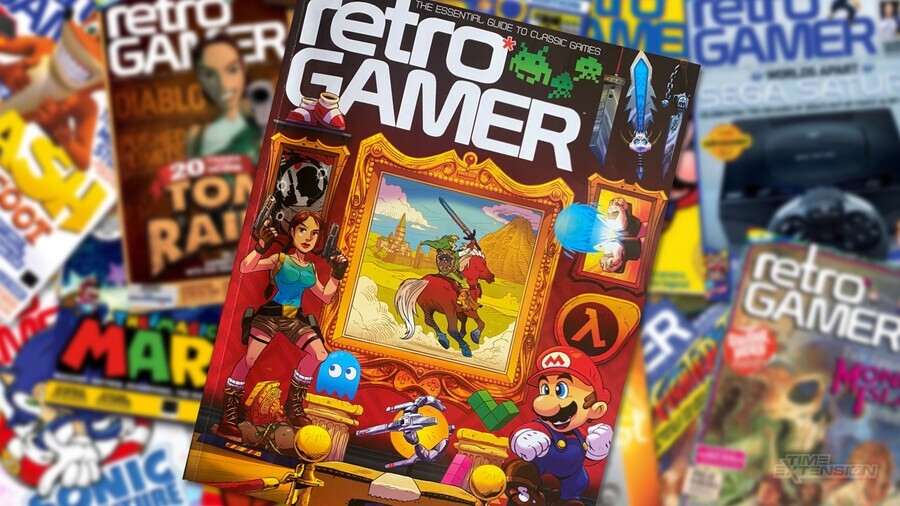
Incredibly, March marks the 20th anniversary of the UK's Retro Gamer magazine, one of the first mainstream publications to truly celebrate the incredible legacy of classic gaming.
Issue one arrived back in 2004 under the banner of Live Publishing, which sadly went bankrupt the following year. Thankfully, Imagine Publishing stepped in and took over the magazine, installing GamesTM retro editor Darran Jones in the editor's chair – a position he has now held for almost 19 years.
Retro Gamer is a special magazine for us here at Time Extension. Not only has it proven to be a source of inspiration over the years, but Jones was the first person to commission me as a paid writer. Simply put, without Retro Gamer, my career might have been very different today, and that's something I'll be eternally grateful for.

Jones was kind enough to sit down with us for an interview to discuss Retro Gamer's amazing longevity, his favourite moments as editor and what the future holds for the magazine.
Time Extension: Congratulations on 20 years! When you stepped into the editor's chair, did you think you'd be doing the job for such a long time?
Darran Jones: Not at all. I'd never edited a mag before Retro Gamer, so I spent the first year worrying that I'd get replaced by somebody more capable. Fortunately, that never happened, and I'm still doing something I love 18-odd years after I first started on the mag.
What's been the highlight of your time as Retro Gamer editor so far?
There's been numerous ones, if I'm honest. Getting to write an article about the Making Of Strider, interviewing Chris Stamper, winning the GMAs in 2010, visiting studios like Rare, interviewing countless developers, and meeting readers at events. I once made a bucket list of all the things I wanted to achieve in the magazine and managed to complete it many years ago. It's probably high time I put another together.
What's the biggest challenge when it comes to creating a monthly retro gaming magazine?
It's probably making sure that each issue feels as balanced as possible. The success of Retro Gamer means that once-new systems are now eligible for inclusion, so that means space always feels like it is at a premium as you're trying to craft something that will appeal to as many people as possible. Generally, I think we do a good job at creating a magazine that appeals to a good number of people; our strong sales certainly seem to suggest that.

You've got Wil Overton to do the cover for your birthday issue, someone who has worked with the magazine many times in the past. What do you think makes his artwork so appealing to classic gamers?
I've loved Wil's work since the days of Super Play, so it's always a pleasure to feature him on the cover of the magazine. There's a character and charm to his work which I feel really resonates with a large number of readers, and his work remains linked to an iconic era of gaming for a great many gamers, so nostalgia is at play, too.
What changes have you noticed in the world of retro gaming during your tenure?
Well, it's a lot more popular than when I started writing, that's for sure.
When I first started on GamesTM there seemed to be very little mainstream interest in retro gaming, but that's changed hugely in recent years. You've only got to look at the many retro book publishers, magazines and YouTube channels that have followed in Retro Gamer's wake to see how much of an audience there is for retro gaming today. Websites, Instagram feeds, retro shops – retro gaming seems to be everywhere, and let's not forget the many compilations that are continually released, along with indie games with retro aesthetics and mini consoles and systems like the Evercade.
It's great to have had an influence on where retro gaming now is, even if it's a ridiculously small one.
We personally know many writers who started out on Retro Gamer and have gone on to enjoy careers in the games media industry and beyond. How does it feel to have been responsible for giving so many people their big break?

I don't really feel like I've been responsible for giving anyone their big break, so to speak; I just believe in offering the opportunities that were once offered to me. Gamestyle's Dean Swain took a chance on me about 20 years ago when I first wanted to write about video games, and I've simply been paying forward the belief he had in me ever since.
What does the future hold for Retro Gamer magazine?
Hopefully, another 20 years, although I'll be 70 by then! I'd imagine that we'll keep doing what we've always been doing – archiving gaming history and continuing to highlight the work of the creators of all those games we used to love so much when we were kids.
I've spent more than half more working career editing Retro Gamer, and I wouldn't have it any other way.
We'd like to thank Darran for giving up his valuable time to speak with us. You can pick up Retro Gamer's 20th-anniversary issue here.
